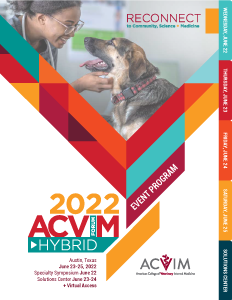Back
Scientific Session
Small Animal Internal Medicine
The Gastrointestinal Microbiome in Critical Illness
Saturday, June 25, 2022
9:10 AM – 10:10 AM CT
Location: Hilton 615
CE: 1
- PB
Patrick C. Barko, DACVIM (SAIM)
Visiting Research Specialist
University of Illinois
Urbana, Illinois, United States
Primary Presenter(s)
The gastrointestinal microbiome is a diverse consortium of microorganisms inhabiting the intestinal tracts of all mammals that is essential to maintaining host animal health. Enteric microbiota dysbiosis (EMD) has been identified in humans and other animals with acute critical illnesses. Common pathophysiologic features of critical illness can cause EMD by altering the intestinal microenvironment. Antibiotics, proton pump inhibitors, and other therapies delivered in intensive care units are also associated with the induction of EMD. Once EMD is established, it can influence the progression of critical illnesses and increase susceptibility to sepsis, acute lung injury, and multiple organ dysfunction syndrome in critically ill patients. Therapies intended to alter the GI microbiome have reduced morbidity and mortality in humans and other animals with critical illnesses. There are few studies of the GI microbiome in critically ill dogs and cats, making this an important and promising area for future research. This lecture will review current knowledge regarding how host-microbiome interactions and therapeutic interventions that alter the GI microbiome play a role in the pathogenesis and pathophysiology of critical illnesses.
Learning Objectives:
- Understand how changes in the intestinal microenvironment, including dysbiosis, associated with acute critical illness influence the pathogenesis and progression of critical illnesses.
- Understand how common critical care therapies affect the composition and function of the GI microbiome.
- Understand the importance of establishing enteral nutrition on gut health and function in critically ill patients.

